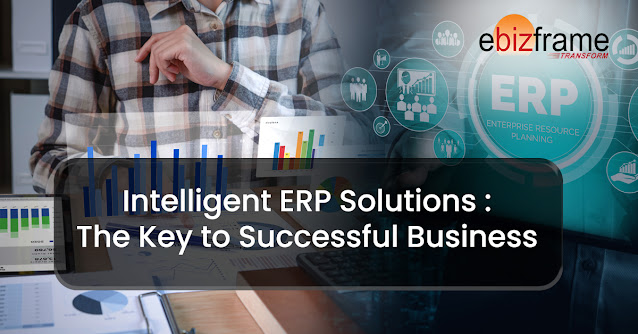In today's fast-paced healthcare environment, small clinics face numerous challenges, from managing patient records to ensuring efficient billing processes. The implementation of Healthcare ERP Software has emerged as a transformative solution to streamline operations, improve patient care, and enhance overall clinic efficiency. But is it worth the investment for small clinics? Let's delve into a cost-benefit analysis of Healthcare ERP Software, with a special focus on the ebizframeRx suite. Understanding Healthcare ERP Software
Healthcare ERP Software, such as the ebizframeRx suite, is designed to integrate various administrative, clinical, and financial functions within a healthcare facility. It offers a powerful array of 35 specialized modules, including an advanced EMR system tailored specifically for doctors, to streamline workflows within hospitals and clinics.
Costs of Implementing Healthcare ERP Software
Initial Costs:
- Purchase or Subscription Fees: The upfront cost for purchasing or subscribing to a Healthcare ERP Software can be significant. However, solutions like ebizframeRx are competitively priced, offering a range of packages tailored to different clinic sizes and needs.
- Hardware and Infrastructure: Initial setup may require investment in new hardware or upgrades to existing systems to support the software.
Ongoing Costs:
- Maintenance and Support: Continuous maintenance and support are essential to ensure the system runs smoothly. This includes regular software updates and troubleshooting.
- Training: Staff training is crucial for the effective use of the new system. While this incurs additional costs, comprehensive training programs can significantly enhance user proficiency.
Hidden Costs:
- Downtime during Implementation: Transitioning to a new system may cause temporary disruptions in daily operations.
- Resistance from Staff: Initial resistance to change can slow down the adoption process, requiring additional time and effort to manage.
Benefits of Healthcare ERP Software for Small Clinics
Operational Efficiency:
One of the primary advantages of implementing Healthcare ERP Software is the significant improvement in operational efficiency. The ebizframeRx suite, for instance, streamlines administrative processes, reduces paperwork, and automates repetitive tasks. This allows healthcare providers to focus more on patient care rather than administrative burdens.
Enhanced Patient Care:
Quick and easy access to comprehensive patient records through an advanced EMR system is a game-changer. It enables healthcare providers to make informed decisions promptly, improving patient outcomes. Efficient appointment scheduling and management further enhance the patient experience.
Financial Management:
Accurate billing and invoicing are critical for the financial health of any clinic. Healthcare ERP Software ensures precision in financial transactions, reducing errors and improving cash flow. The revenue management suite of ebizframeRx helps clinics manage their finances efficiently.
Compliance and Security:
Adherence to industry standards such as DICOM 3.0, HL7, and IHE is essential for ensuring interoperability and data security. The ebizframeRx suite complies with these standards, ensuring secure access to patient data from anywhere, anytime, even on public networks. Advanced security measures safeguard sensitive patient information, providing peace of mind.
Scalability and Flexibility:
The modular design of the ebizframeRx suite allows small clinics to tailor the software to their specific needs. Whether it’s patient registration, pharmacy management, or laboratory integration, clinics can choose the modules that best fit their workflow. This flexibility supports clinic expansion and adapts to changing needs.
Real-World Success Stories :
Many small clinics have successfully implemented the ebizframeRx suite, witnessing remarkable improvements in efficiency and patient satisfaction. For instance, a small clinic in a suburban area reported a 30% increase in operational efficiency within six months of implementation. The staff noted significant reductions in administrative workload, allowing them to dedicate more time to patient care.
Overcoming Challenges :
Implementation Challenges:
Implementing new software comes with its challenges, such as resistance to change and high initial costs. However, these challenges can be mitigated with effective training programs and by choosing the right vendor who understands the unique needs of small clinics.
Pre-Investment Factors:
Before investing in Healthcare ERP Software, clinics should assess their size, specific needs, and long-term goals. It’s essential to choose a solution that offers scalability and flexibility, ensuring it can grow with the clinic.
Conclusion
The cost-benefit analysis of Healthcare ERP Software, particularly the ebizframeRx suite, reveals that while there are significant initial and ongoing costs, the long-term benefits far outweigh them. Improved operational efficiency, enhanced patient care, better financial management, and compliance with industry standards make it a worthy investment for small clinics.
Are you ready to transform your clinic's operations and patient care? Discover how ebizframeRx can help streamline your processes and enhance your clinic's efficiency. Contact us today at marketing@ebizframe.com and visit us at www.ebizframe.com for a consultation and take the first step towards a more efficient and patient-centric healthcare practice.
By carefully weighing the costs against the benefits, small clinics can make informed decisions about adopting Healthcare ERP Software, ultimately enhancing their ability to provide high-quality care.




Comments
Post a Comment